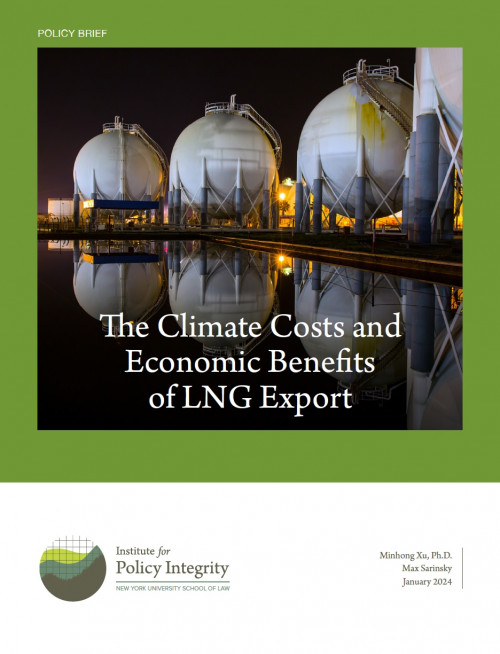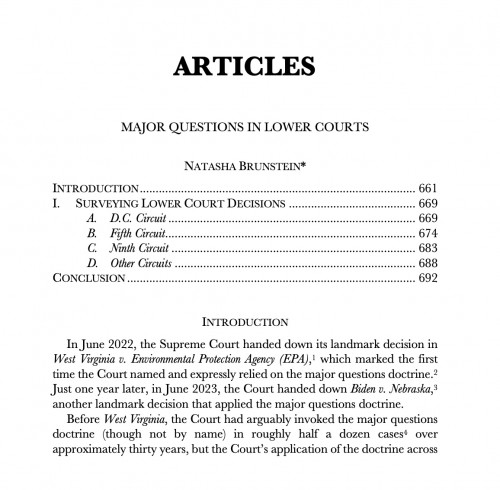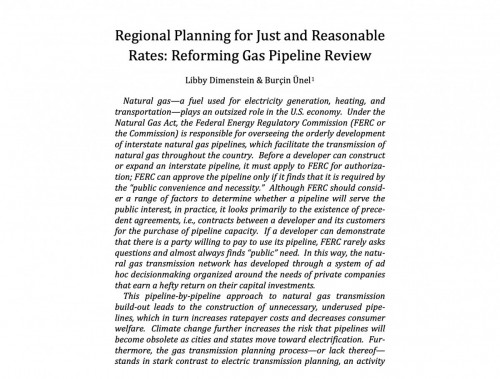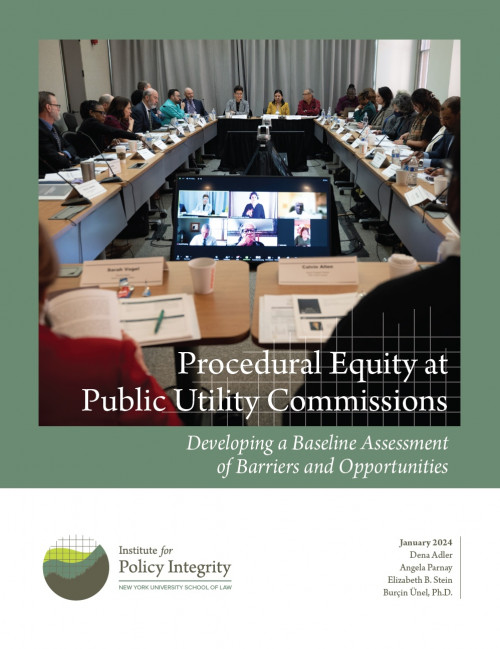-
Comments to CFTC on Voluntary Carbon Credit Derivatives Guidance
In December 2023, the Commodity Futures Trading Commission (CFTC) proposed guidance that identifies key features of high-integrity voluntary carbon credits (VCCs) for exchanges that list certain VCC derivatives. The Institute for Policy Integrity submitted comments that highlight additional sources of CFTC legal authority over these derivatives and suggest improvements to the proposed guidance’s discussions of additionality, leakage risk, quantification, risk of reversal, and exchanges’ discretion to set stringent standards. Finally, our comments recommend that the CFTC explore whether it has other authority to address issues with VCC integrity and whether to seek additional authority from Congress.
-
Comments to FTC on Proposed Rule on Unfair or Deceptive Fees
In 2021, Policy Integrity submitted a petition for rulemaking to the Federal Trade Commission (FTC) calling for a ban on the use of drip pricing. After granting the petition, the FTC in 2023 proposed a Trade Regulation Rule on Unfair or Deceptive Fees (Proposed Rule). The Institute for Policy Integrity submitted comments with suggested edits and additions to the regulatory text to ensure that the Proposed Rule fully codifies FTC's stated objectives. Our comments also suggest several actions to strengthen FTC's breakeven and cost-benefit analyses.
-
Comments to DOE and CPO a National Definition for a Zero Emissions Building
The Department of Energy (DOE) and the Office of Domestic Climate Policy (CPO) published a Request for Information on a National Definition for a Zero Emissions Building. The Institute for Policy Integrity at New York University School of Law (Policy Integrity) submitted comments through DOE and CPO's question-and-answer textbox format.
-
Comments to EPA on Draft Revision of Technical Guidance for Assessing Environmental Justice in Regulatory Analysis
EPA seeks comments on the it's Draft Revised EJ Technical Guidance, which highlights technical approaches that analysts can use to evaluate environmental justice concerns in regulatory actions. The Institute for Policy Integrity's comments to the agency advocate for enhanced documentation and transparency in environmental justice assessments.
-

The Climate Costs and Economic Benefits of LNG Export
Gas provides nearly a quarter of the world’s total energy supply. As part of that supply chain, gas is shipped between continents in the form of liquefied natural gas (LNG). The United States is now the world’s largest LNG exporter following a surge in gas exports since 2016, but these exports have generated controversy due to their climate effects.This policy brief provides an analysis to support an effort to balance the full range of impacts from LNG exports. Using DOE’s own published studies, we compare the climate cost per unit of LNG export to the economic benefit (measured using consumer welfare). We find that climate costs likely exceed economic benefits. While the precise difference depends on several factors, gross climate damages greatly exceed economic benefits under all scenarios evaluated. These findings provide useful insights as DOE prepares to re-evaluate the LNG export program.
-

Major Questions in Lower Courts
Published in the Administrative Law Review
In June 2022, the Supreme Court handed down its landmark decision in West Virginia v. Environmental Protection Agency (EPA), which marked the first time the Court named and expressly relied on the major questions doctrine. This Article surveys how lower federal courts have interpreted West Virginia and applied the major questions doctrine. There is no one major questions doctrine in the lower courts. Judges have taken vastly different approaches to defining and applying the doctrine both within and across circuits. These differences illustrate that many judges may view the doctrine as a little more than a grab bag of factors, which they seem to be choosing from at their discretion. Lower court judges do not appear to be constrained in how they apply the doctrine. In a majority of cases concerning Biden Administration agency actions and executive orders, judges applied the doctrine to reach outcomes that aligned with the political party of their appointing President.
-

Regional Planning for Just and Reasonable Rates: Reforming Gas Pipeline Review
Published in the Columbia Journal of Environmental Law
Natural gas plays an outsized role in the U.S. economy. Under the Natural Gas Act, the Federal Energy Regulatory Commission (FERC or the Commission) is responsible for overseeing the orderly development of interstate natural gas pipelines, which facilitate the transmission of natural gas throughout the country. FERC can approve the pipeline only if it finds that it is required by the “public convenience and necessity.” Although FERC should consider a range of factors to determine whether a pipeline will serve the public interest, in practice, it looks primarily to the contracts between a developer and its customers for the purchase of pipeline capacity. If a developer can demonstrate that there is a party willing to pay to use its pipeline, FERC rarely asks questions and almost always finds “public” need. This pipeline-by-pipeline approach to natural gas transmission build-out leads to the construction of unnecessary, underused pipelines, which in turn increases ratepayer costs and decreases consumer welfare. Climate change further increases the risk that pipelines will become obsolete as cities and states move toward electrification. Relying on economic theory, legal history, and policy analysis, we make the case in this paper—pulished in the Columbia Journal of Environmental Law— for FERC’s adoption of regional gas transmission planning.
-
Comments to CEQ on Phase One of the Environmental Justice Scorecard
The Council on Environmental Quality (CEQ) recently published Phase One of the Environmental Justice Scorecard (Scorecard), which evaluates federal agencies' progress on advancing the Justice40 Initiative, implementing and enforcing environmental and civil rights laws, and institutionalizing environmental justice. CEQ sought public feedback on the Scorecard’s usability and potential qualitative and quantitative metrics to improve future iterations of the Scorecard. The Institute for Policy Integrity submitted comments recommending several changes to enhance transparency, accountability, and comprehensiveness.
-

Procedural Equity at Public Utility Commissions
Developing a Baseline Assessment of Barriers and Opportunities
Combatting climate change will require major transitions in the energy sector. In the United States, state-level entities like public utility commissions play a key role in this transition. Commissions help decide where and when clean energy displaces fossil-fuel combustion, and how costs associated with energy system investments are passed on to consumers, so their actions can affect emissions outcomes as well as the health, energy, environmental, and affordability burdens faced by disadvantaged communities. Although many Commission processes incorporate some form of stakeholder input or participation, it is often difficult for the public to participate due to the technical and complex nature of these proceedings. These challenges present a procedural justice issue. In this report, we reviewed a range of practices for enhancing procedural justice at Commissions in nine states. This review was based on a structured survey of Commissions’ websites, resources available to prospective participants, and relevant statutes and regulations.
-
Amicus Brief in Challenge to Oil and Gas Permitting in Alaska
The Willow Master Development Plan is a proposed oil and gas development project in the National Petroleum Reserve in Alaska led by ConocoPhillips. In 2020, the Bureau of Land Management (BLM) approved the project for development. In 2021, the U.S. District Court for the District of Alaska vacated BLM’s approval of the Willow Project, but BLM prepared a supplemental environmental impact statement (SEIS) and subsequently re-approved the Project with fairly minor modifications. In March 2023, Plaintiffs challenged BLM's approval. We filed an amicus brief in the U.S. District Court for the District of Alaska in support of Plaintiffs to provide reasons supporting vacatur if the Court grants summary judgment to Plaintiffs. In January 2024, we filed our amicus brief in the U.S. Court of Appeals for the Ninth Circuit after the Plaintiffs appealed the district court's decision in favor of BLM.









